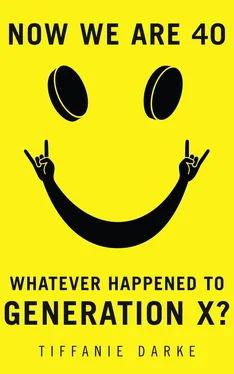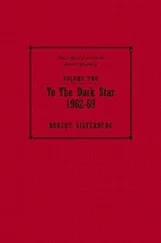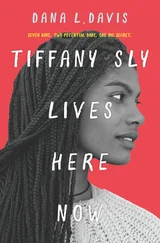As Agent Provocateur proved, first you need a good product (and post Gerald Ratner everyone now knew that) and second you need to tell a good story around it. ‘The marketing guy used to be the least important person in the business,’ says Richard Reed. ‘But in the Nineties you saw the rise in priority of telling a story about your product. It’s got more and more important, to the point now where the marketing guy’s actually on the board. It’s product and story: the whole company has got to really care about what you are producing and serving up.’ Marketing became a creative art.
The pursuit of money, or going into business, on the other hand, was not perceived in any way as creative at that time. It was for people in suits who carried briefcases and wanted to hang out with dreary bank managers. Besides it was all about money – and money, post Eighties, was vulgar. Business was Arthur Daley or Harry Enfield’s Loadsamoney – only for the greedy and the brash. Post Eighties, we all know where that ended: Black Monday, a property crash, the collapse of the economy. Thatcherism was deeply unfashionable. Nevertheless, the idea anyone could now have a go – could propel themselves up the social and economic ladder – should they so wish, was embedded in Generation X. The subliminal message of Thatcherism struck deep. It was to supercharge the entrepreneurialism of the next decade.
‘It’s always been quite trendy to Thatcher bash, but for me the idea about freeing up the ability to do your thing was a really important part of my psyche,’ says the fitness trainer Matt Roberts. ‘As a 15-year-old, I had the idea for doing the business I now have. I grew up in the leafy county of Cheshire, a white, middle-class area. But my parents came from South Wales, my dad was from the Valleys, and only got out because he played football. First for Arsenal, then Wrexham, which was how we ended up in Cheshire. He had this great opportunity for leaving the Labour heartlands of the Valleys. My grandmother had a council house on an estate in Swansea but when my dad retired from football – and in those days you didn’t have anything like the cash you have now – my mum made the money by setting up a clothes shop. For my friends, that wasn’t the case. They’re from classic Labour-supporting families and didn’t believe they could go and do anything different. They settled for being in the same four-room box house.’
But the idea of what a business was and could be was about to change. There were already two trailblazers offering a different type of model: Anita Roddick and Richard Branson. The latter started out by setting up a record label (obviously cool) and the former was militant in using her business to promote a new kind of ethics: not testing products on animals. These two voices may have been alone in the idea that business could be a force for good, but they were also very loud and influential. It was not to be until the time of the Millennials – when business, aided by the digital revolution, became the new rock ’n’ roll – that the idea that business should help shape society took hold. Innocent was about to show how it could be done, how business could marry our values and social consciousness, and be interesting and fun at the same time.
Founded in 1998 by three student friends who met through their shared love of house music, it mixed up the cool of nineties advertising and marketing messages with the health of a generation on a hangover. Their cute, colourful bottles of mango and passion fruit, strawberries and banana and kiwi, and apple and lime juices, spoke directly to the customer, promising ‘to help you and heal you’, advising you to ‘shake before opening not after’ and even flirting with you: strawberries were included because they ‘go very nicely with your lipstick’ (‘wackaging’ or wacky packaging, as it came to be known). At the time, this challenged all the ideas of what big companies thought of as business. Innocent started with the consumer first. What do they want? What language do they speak? When they think of Innocent do they want to think of a boardroom of suits or someone like them?
Richard is now a handsome fortysomething who is still sporting scruffy hair, T-shirt and skinny jeans, exactly the same outfit that so disrupted the business community back in the Nineties.
‘Innocent was always just a little bit subversive,’ he says. ‘Other businesses were obsessed with supply chains and the bottom line, whereas Innocent was about thinking about the individual first. We are a very individual generation. In the Nineties we saw everything had started to change, that you could reinvent what it is that you want. You can say, Do you want a blue sweater or a red one? Or you can say that you don’t have to have either. Reinvent the choice architecture.’
What they did was pledge to donate 10 per cent of all their profits to charity. They also invested their staff in their company, gave everyone beer on a Friday and handed out £1,000 scholarships. Headquarters was ‘Fruit Towers’ in Notting Hill, a colourful building with astroturf, table-tennis tables and beanbags, and they drove around in funny-looking trucks covered in grass or painted in cow print. (This was just as Silicon Valley culture was beginning to make hoodies and office table-tennis tables a thing. Now of course, they are a total cliche.) Innocent caught our attention – partly because no one had been sold a fruit drink promising ‘ground-up cats’ before, and partly because the City and the business pages had never met ‘businessmen’ like this before. ‘If you’re going to turn up to a meeting in a T-shirt, you’ve got to be even more on top of your game than a guy in a suit, so people take you seriously,’ smiles Reed.
Being nice to people was the company culture too. It wasn’t solely about feathering your own managerial nest and hitting your profit targets, it was about having a nice time. After all, Reed and his partners, Adam Balon and Jon Wright, had started out in business putting on club nights together. ‘At Innocent we had ten babies out of it – everyone was copping off with each other!’ Business started to take on a new kind of shape. ‘Hippies with calculators’, is how one newspaper article described them, which Reed likes a lot. The father of hippie capitalism.
As their traction grew, so did the interest of the big corporates, and in 2009, pre sugar crisis, Coca-Cola invested in the company – going on to buy it out three years later for £100m. ‘When we cashed in I ended up with a big number in my bank account – and believe you me it was about 30 per cent bigger than the number we thought we could ever achieve in our wildest dreams. But far better than that was the fact that everybody in that building also had a number in their bank account that day,’ says Reed.
‘We made several millionaires, and that for me was the benefit of what we did. That was where I felt good about what we had done, and was worth far more to me than the 10 per cent profit difference in my own actual number. Do you need that extra 10 per cent or are you going to get more spiritual value for sharing that out amongst the people that got you there? I still don’t understand even today why other businesses don’t do that.’
The truth is, many new businesses now do build in an ownership or partnership structure. As the dotcom queen Martha Lane Fox says, ‘Everything I’ve started now is not for profit, but I like to think that the world has so dramatically shifted that unless you embed some wider social purpose right from the beginning, your brand would not be so robust. If I was starting my travel business Lastminute.com again, I think people would now expect that extra dimension of “Okay, so you’re doing all this travel, where’s the carbon offsetting? Why don’t you have more holidays to help clean up beaches?” You’d have to invent that right at the beginning, but it didn’t occur to us when we started that social purpose was something.’
Читать дальше












